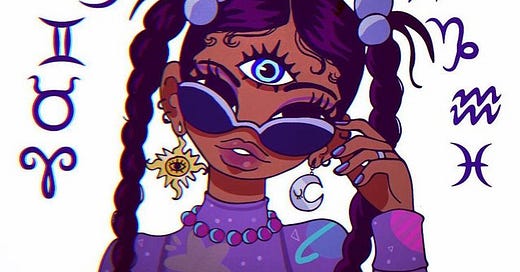I am looking for a Gen-Z(odiac) editor to help me enhance my long poem “An Introduction to Chaos Magic(k)” (see my Substack archive for a draft). I am looking for someone in that twenty to thirty age range—perhaps someone even who has a Tamagotchi stickered laptop, or who envisions herself as a Hello-Kitty princess (tiara and all), or who has written her own emoji spells, or who thinks Mercury’s position shapes her mood, or who loathes herself (and perhaps reality itself) enough to gang stomp knowingly good people on the internet. The main character of the poem falls in that range and the whole point of the poem is to capture her spirit (and thereby, since she is so emblematic of her time, the current spirit of the mainstream).
Email me if interested at michael.istvan@gmail.com. Please attach your resume and brief description of how you think your editorial eye can benefit the project. I have set my upper limit at $2000.
Here, by the way, are my own notes on the character. Unlike the poem, which aims to be merely descriptive, these reflect my own personal judgment on her (if that is worth anything to understanding the poem).
At first I was iffy about the Gen-Z(odiac) character in “An Introduction to Chaos Magic(k).” I found it easy to write her off as one of those pathetic social-media bullies (the suburban cop callers of the digital age) who—even if it takes libel and slander—will report any account, especially if nonblack-owned, that “triggers her” or “does not reflect her values.” The type is now well known: one of those boilerplate my-truthers, faking fragility for power and attention, common on college campuses (especially since the political rise of Trump and the subsequent reaction on the left about the dangers of free expression). Her love of astrology and healing crystals and tarot, all of which seem a cover for a depressive nihilism, are particularly upsetting. She seems to believe they are congruent with black power when in truth, as too with the liquor and drugs she enjoys, they are poisonous to blacks—and to all people whose generational oppression has kept them in an educational darkness that makes them susceptible to such scams. But even if she is emblematic of US disintegration to pre-Enlightenment superstition (as China becomes the dominant world power), it is clear she is suffering and—shallow as all hell (uncritical, obsessed with makeup and designer handbags and shimmer mists and shoes, thriving on gossip and drama)—knows not what poison she spreads. Indeed, I find my respect for her grow as she lingers in my mind. Her innocence is a factor. Her hard work is a factor. That she has dreams is a factor. That she wants to improve herself is a factor. Perhaps the main thing, though, is my belief in her potential to do much good in the world if she can break free of her addiction to this ethos of victimhood and vengeance and magical thinking that makes her, despite what she thinks, so unoriginal and toxic.





